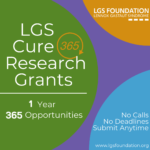2022 Grant Recipients – Ryan Jamiolkowski & Ivan Soltesz
Preclinical Optimization of a Non-Invasive Approach to DBS in LGS

Ryan Jamiolkowski, MD, PhD
Stanford University

Ivan Soltesz, PhD
Stanford University
Highlights:
- Assesses low-intensity ultrasound for seizure treatment.
- Targets the centromedian thalamus in mice that have seizures from LGS.
- Determines the feasibility of applying focused ultrasound as a non-invasive substitute for deep brain stimulation (DBS) in LGS.
Results: Grant In Progress
Results will be shared when the grant is completed.
Lay Abstract:
Using low-intensity ultrasound, we can modulate brain activity in select areas, including deep in the brain, like the thalamus, but more research is needed to understand how to harness this technology for seizure control. We have already demonstrated in mice that ultrasound can control cells in the same part of the thalamus (the centromedian nucleus) that DBS targets in LGS patients. We have also shown that ultrasound aimed at a different brain target (the hippocampus) can stop seizures for temporal lobe epilepsy, a different kind of epilepsy from LGS. In this project, we will combine those findings to target the centromedian thalamus in mice that have seizures from LGS. If that intervention succeeds, then focused ultrasound could be a non-invasive substitute for deep brain stimulation in LGS, circumventing the need for surgery.
 The LGS Foundation accepts unsolicited proposals year-round to seed new basic, translational, and clinical research projects on LGS. Projects may be funded at the $25,000, $50,000, or $75,000 level.
The LGS Foundation accepts unsolicited proposals year-round to seed new basic, translational, and clinical research projects on LGS. Projects may be funded at the $25,000, $50,000, or $75,000 level.
Updated 01/09/25 (KK)
